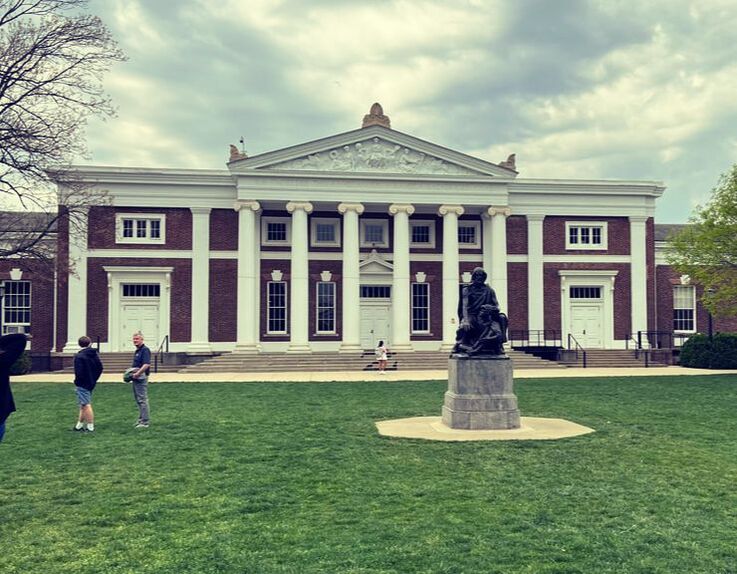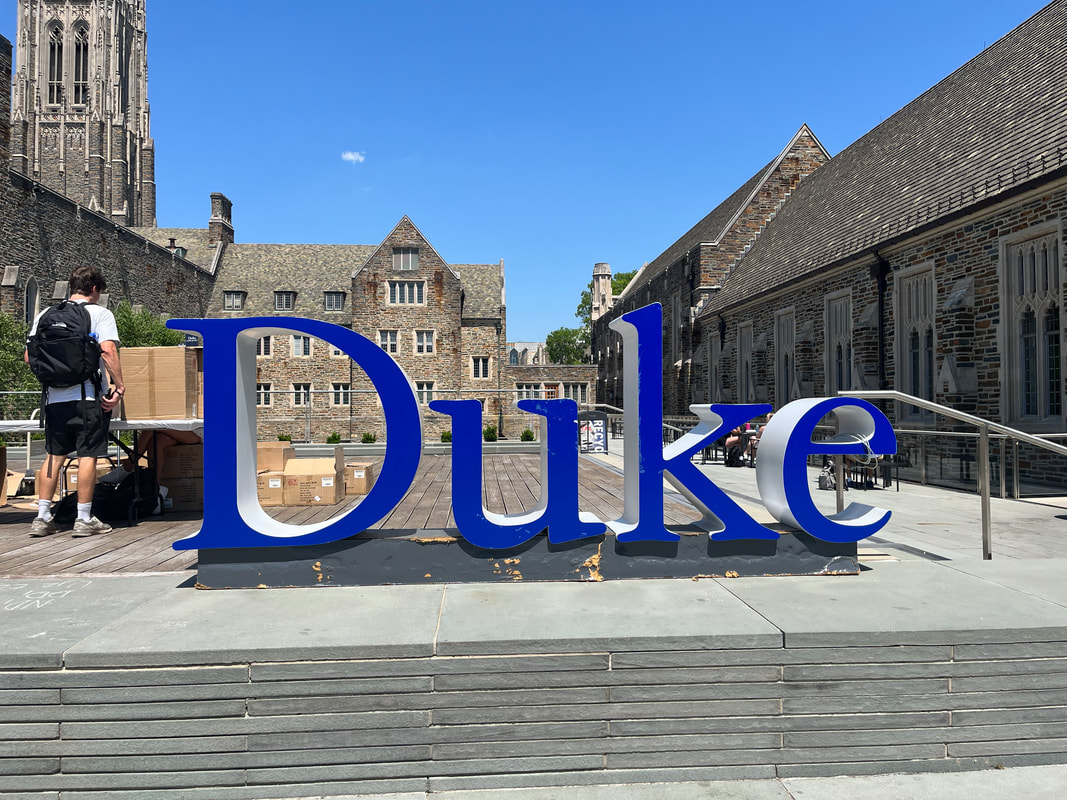|
The University of Utah is incredibly beautiful. I wish my photographic skills could do it justice. It is home to about 26,000 students, is a R1 research institution, and offers a wide variety of majors from Urban Ecology to Mechanical Engineering. It's also great for the health sciences, with a 425-bed hospital on campus. The nursing program also admits as pre-nursing, and offers a BS in Geriatric Nursing Leadership. Somewhat selective, the average admitted student has a 3.6 GPA and test scores are optional. Best of all for my California students, Utah offers WUE for students with a GPA over 3.3. The University of Utah offers a variety of Living Learning Communities, however these fill up quickly so it's best to apply early. Most students are admitted pre-major, and there is no portfolio required to apply to the architecture program. The campus is in Salt Lake City, a remarkably clean and spacious city. Californians should be aware that many stores are closed on Sunday and the elevation is 4500. The University of Utah is considered an island of diversity in a mostly conservative, religious city. The people we met were all very friendly and the university wants Californians!
0 Comments
Georgia Tech Admission BlogRead on blog or ReaderThree Messages about College Admissions for JuniorsRick Clark
April 15 Warning: The subtitle is this blog is “That you may not like to hear.” And unlike most of my intros, we’re not going to waste time or words on analogies, personal anecdotes, or admittedly stretched parallels. Instead, after watching this cycle repeat itself, here are the three direct messages/ primary hopes I have for juniors entering the college admission experience. Don’t apply to a college you would not actually attend. Seniors did this. I know, right? They basically walked into a store looking for jeans and went to the section three sizes up from theirs and were like- “Yea, I'll put those in my cart just to have a few extra.” Does that sound dumb? It is. Think about it this way- there are 2000+ four-year colleges in America, not to mention the thousands of other post-secondary options around our country and abroad. I’m guessing if someone lined up that many pairs of jeans you could easily find 7 or 9 or 11 that you could afford, fit well, and you would be excited about/proud to wear. Many application fees are $50 or more. Need suggestions for better uses of that money? Donate to a local non-profit, take your mom out to lunch, Venmo me, basically do anything with it except what the seniors just did. Want more details and insight? Check out this podcast with Rachel Hernandez, vice provost for student affairs at Johns Hopkins University. Not a podcast listener? Ok. Then hear this: Don’t apply to a college you would not actually attend! The “College Search” is internal. See, the seniors heard “search” and they went looking like a Survivor contestant scouring the island for immunity idols. This ain’t that. How do you know what to plug into a Google search if you haven’t taken time to reflect on what you value, or your hopes and goals for college and life beyond? So, yea. I’m going to be that guy and tell you to get off your phone. Worse still- I'm telling you to go somewhere quiet on your own and really listen to yourself...more than once. And too really go overboard here, maybe even bring a pen and paper and right stuff down about what you really need and want. Again, the subtitle is, “that you may not like to hear.” Promise made- promise kept. Look. As a talented student and a relatively good person, an annoyingly large number of people are going to have opinions about where and why you should visit, apply, or attend certain schools. Oh... and they’re going to tell you whether you like it or not. At the end of the day, we live in a noisy, busy world. My hope is that you will consistently pull away for a few hours to listen and be honest with yourself. The truth is that these decisions just keep getting bigger- where to apply becomes where to attend. Where to attend becomes what to major in. What to major in becomes job, city, community, family. Oh, yea. I can draw a throughline from today to one far in the distant future based on how you approach this. But hey- you are a junior and we are just on #2, so let’s start with and commit to this. Don’t do what they seniors did! Don’t begin by searching Google with criteria someone else told them was important. Don’t start by looking at rankings or lists of colleges that a marketer developed to sell ads and peddle clicks. The college admission search is internal. Nothing happens to you in college admission. Read that carefully. I did not say “nothing happens.” Just that nothing happens to you. Now, to be fair to the seniors, this has been a tumultuous and unprecedented year, particularly in light of the FUBAR FAFSA situation, the first cycle following a landmark SCOTUS case, and noise and variance in testing policies around the country. Still, there was way too much why did this happen to me mentality and not enough why did this happen for me? inquiry. Here’s the truth- next year there will also be change, unexpected events, personal and macro challenges, and general unpredictability. This spring, as admission and scholarship information has come out, a lot of seniors (and their parents) have effectively said: “What did I do wrong?” or “What else could I have done?” or (directly or indirectly) “This whole thing is broken and unfair.” Well, in the spirit of “messages you might not like to hear,” that’s college admission, that’s college, and really that’s life. As a junior, however, you have a choice. When things don’t go exactly as you hope/plan, i.e. you get deferred, denied, waitlisted, or you don’t receive the amount of money you need to attend a particular school, you can cry/wallow/point fingers/ take your ball and go home OR you can re-frame from why is this happening to me?to why is this happening for me? Ok. I got deferred. “Why is this happening for me?” Now, I get to decide if I’m still really interested in this school. If so, I get to send my fall grades and submit updated information. I didn’t get admitted. Or I didn’t get into the honors program. Or that scholarship amount is just not enough to make it affordable... why is this happening for me? Now, I get to pivot. I get to figure out another way or explore a different option. I get to show up somewhere else committed to succeeding, building a network, maximizing my opportunities. Nothing happens to you in college admission. What messages do we like to hear? I can help you control this. I can make this easier for you. You are special and amazing and it’s all going to work out. I get it. I’m human. That all sounds good to me too. But it is not true (well, you’re kind of special and amazing). And you best believe you can find (often for $$) lots of people who will guarantee you things in college admission. If you see an ad online or have someone approach you claiming to have the magic formula, the secret sauce (or some other noun preceded by a descriptor), RUN! So, I will not make any guarantees, but I will make you a promise. If you will only apply to places you really want to go and would be excited to attend; if you will begin with asking yourself big and tough questions; and if you will adopt the mindset that the year ahead, while absolutely not predictable or fully in your control, will be one of formation, transformation, growth, discovery, and opportunity; then on the Ides of April 2025, you will have been truly successful in your college admission experience. Hello!
I am sure you are following the drama associated with the Department of Education and FAFSA. Here is a summary to keep you updated. Feel free to share. We know that FAFSA information will not be sent to colleges until mid to late March. * If parents have not completed the FAFSA, it is not 'late', regardless of the date on college websites. Most glitches have been addressed at this time. (exception is for parents without a SS#) * Parents of new college freshman 2024-25 should aim to complete the FAFSA by 3/15. * Current college students should plan to complete the FAFSA by the date on the college website or April 30th in order to receive correct tuition bills. * When logging into studentaid.gov the dashboard should say processing - it will stay this way until FAFSA info is sent to colleges. * Changes to the FAFSA can not be made until the application has been completely processed. Changes can be red flags - be sure that any changes are justified and have documentation. This delay will cause colleges to have very limited time to create financial aid packages and send them to students in a timely manner before May 1st. * Many colleges have already extended the May 1st deadline. * HERE is a list of extended dates by Danny Tejada (thank you Danny) * The California State system has also extended deadlines, read - HERE Possible ways to get a financial aid package now - * Many CSS Profile schools are calculating 'tentative' packages upon request. * Some colleges are requesting their own financial form to be completed and can estimate FAFSA results. * If a student/family will NOT receive need-based aid and has received their acceptance letter - the out of pocket cost to the family can be determined. * Some colleges will complete an 'early read' - similar to the tentative package upon request. The additional delay has a positive effect in that the updated formula will allocate more funds to most families with need. If the student hasn't already, once the FAFSA has been processed they will receive an email with their Student Aid Index (SAI); this can be used to determine need and actual out of pocket costs prior to receiving the financial aid package. Appeal letters for merit can be sent now for certain, specific situations. Be sure that the student is actively checking college portals - this is where the most updated information will become available. If any family would like a college cost comparison, 4-year cash flow spreadsheet or a conversation about college finances - please reach out; https://calendly.com/collegedollar/ Liane Crane TheCollegeDollar.com Member; HECA, NCAG Forbes Financial Aid Article Schedule a College Connect! Duke is no longer giving essays and standardized testing scores numerical ratings in the undergraduate admissions process.
The change went into place this year, Dean of Undergraduate Admissions Christoph Guttentag wrote in an email to The Chronicle. He explained that essays are no longer receiving a score because of a rise in the use of generative artificial intelligence and college admissions consultants. When asked about how the admissions office determines if an essay is AI-generated or written by consultants and if applicants are hurt if the office determines so, Guttentag answered that "there aren't simple answers to these questions." Despite the changes, Guttentag wrote that essays and standardized testing scores are still considered in the admissions process. “Essays are very much part of our understanding of the applicant, we’re just no longer assuming that the essay is an accurate reflection of the student’s actual writing ability,” he wrote. “Standardized tests (SAT or ACT) are considered when they’re submitted as part of the application.” According to Guttentag, essays will now be used to “help understand the applicant as an individual rather, not just as a set of attributes and accomplishments.” He also wrote that the admissions office now values essays that give “insight into who the unique person is whose application we’re reading” and that “content and insight matter more than style.” “Because of that they are not given a numerical rating, but considered as we think holistically about a candidate as a potential member of the Duke community,” he wrote. Previously, the Duke admissions office would assign numerical ratings of one to five on six different categories: curriculum strength, academics, recommendations, essays, extracurriculars and test scores. Applicants would then receive a total score out of 30 by adding up each category’s numerical rating. According to Guttentag, the only categories given numerical ratings now are the four categories that remain: “the strength of a student’s curriculum, their grades in academic courses, their extracurricular activities and the letters of recommendation.” HERE IS A THOUGHT-PROVOKING ARTICLE. PLEASE READ:
Article by Aneesh Raman and Maria Flynn Mr. Raman is a work force expert at LinkedIn. Ms. Flynn is the president of Jobs for the Future. There have been just a handful of moments over the centuries when we have experienced a huge shift in the skills our economy values most. We are entering one such moment now. Technical and data skills that have been highly sought after for decades appear to be among the most exposed to advances in artificial intelligence. But other skills, particularly the people skills that we have long undervalued as “soft,” will very likely remain the most durable. That is a hopeful sign that A.I. could usher in a world of work that is anchored more, not less, around human ability. A moment like this compels us to think differently about how we are training our workers, especially the heavy premium we have placed on skills like coding and data analysis that continue to reshape the fields of higher education and worker training. The early signals of what A.I. can do should compel us to think differently about ourselves as a species. Our abilities to effectively communicate, develop empathy and think critically have allowed humans to collaborate, innovate and adapt for millenniums. Those skills are ones we all possess and can improve, yet they have never been properly valued in our economy or prioritized in our education and training. That needs to change. In today’s knowledge economy, many students are focused on gaining technical skills because those skills are seen as the most competitive when it comes to getting a good job. And for good reason. For decades, we have viewed those jobs as “future-proof” given the growth of technology companies and the fact that engineering majors land the highest-paying jobs. The number of students seeking four-year degrees in computer science and information technology shot up 41 percent between the spring of 2018 and the spring of 2023, while the number of humanities majors plummeted. Workers who didn’t go to college and those who needed additional skills and wanted to take advantage of a lucrative job boom flocked to dozens of coding boot camps and online technical programs. Now comes the realization of the power of generative A.I., with its vast capabilities in skills like writing, programming and translation (Microsoft, which owns LinkedIn, is a major investor in the technology). LinkedIn researchers recently looked at which skills any given job requires and then identified over 500 likely to be affected by generative A.I. technologies. They then estimated that 96 percent of a software engineer’s current skills — mainly proficiency in programming languages — can eventually be replicated by A.I. Skills associated with jobs like legal associates and finance officers will also be highly exposed. In fact, given the broad impact A.I. is set to have, it is quite likely to affect all of our work to some degree or another. We believe there will be engineers in the future, but they will most likely spend less time coding and more time on tasks like collaboration and communication. We also believe that there will be new categories of jobs that emerge as a result of A.I.’s capabilities — just like we’ve seen in past moments of technological advancement — and that those jobs will probably be anchored increasingly around people skills. Circling around this research is the big question emerging across so many conversations about A.I. and work, namely: What are our core capabilities as humans? If we answer that question from a place of fear about what’s left for people in the age of A.I., we can end up conceding a diminished view of human capability. Instead, it’s critical for us all to start from a place that imagines what’s possible for humans in the age of A.I. When you do that, you find yourself focusing quickly on people skills that allow us to collaborate and innovate in ways technology can amplify but never replace. And you find yourself — whatever the role or career stage you’re in — with agency to better manage this moment of historic change. |
Masland Educational Consulting
|






 RSS Feed
RSS Feed
